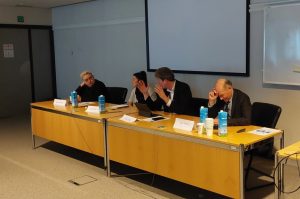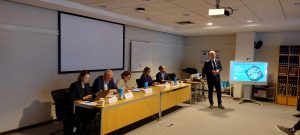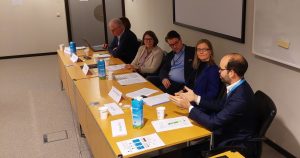“Charting the Path to Sustainable Resource Management: Unveiling the 2024 Global Resources Outlook Report (GRO24)”
On March 5, GLOBE EU members Sirpa Pietikäinen, Paul Tang, Heidi Hautala, and Ville Niinistö were joined by Janez Potočnik and a host of experts to learn about the IRP’s 2024 Global Resource Outlook.
The meeting focused on the urgent need to address climate change and resource use inefficiency, emphasizing the importance of cooperation, sharing, and collective responsibility in solving global socio-ecological problems.
Participants discussed the limitations of current policies and the necessity of integrating circular economy principles, demand-side solutions, and nature-based solutions into climate action to achieve sustainable resource use and enhance human well-being.
The conversation also highlighted the need for systemic change, including institutional governance, financial incentives, and equitable resource distribution, to ensure a fair and green future.



GLOBE EU event: “Navigating the Shifting Landscape: Developing Skills and Education for a Sustainable European Future”
On November 15, 2023, GLOBE EU board members Sirpa Pietikäinen and Paul Tang welcomed speakers from the European Commission, the European Investment Bank (EIB), the League of European Research Universities (LERU), the All European Academies (ALLEA), as well as representatives from Bee Group members Dow and Nestlé, and Microsoft and Lenovo.
During the meeting, participants discussed the integration of sustainability and digital skills into the European education system, the challenges faced, and potential solutions to support the European Green Deal and sustainable development.
Key points included:
- The need for a comprehensive approach to education that includes sustainability and digital skills across all levels, from early education to lifelong learning.
- The importance of teacher training and professional development to equip educators with the knowledge and confidence to teach sustainability and climate change topics.
- The role of universities in embedding sustainability into their curricula and fostering interdisciplinary approaches that include social sciences and humanities.
- The challenges of aligning educational content with national curricula and ensuring that sustainability topics are assessed to incentivize teaching.
- The potential of digital technologies, such as AI, to transform education but also the need to consider ethical implications and the environmental impact of digitalization.
- The significance of partnerships between educational institutions and the private sector to bridge the gap between education and industry needs.
- The European Commission’s Erasmus+ program’s focus on supporting green initiatives, including increasing mobility opportunities in forward-looking green domains and fostering collaboration among various stakeholders.
Overall, the meeting highlighted a collective ambition to advance sustainability and digital education but recognized the need for coordinated action, practical tools, and systemic change to achieve these goals.
Securing the EU’s Resource Efficiency – A Systemic Approach, September 26, 2023
The GLOBE EU conference of September 26 focused on the need to secure the EU’s resource efficiency and prevent its economy from becoming reliant on non-energy natural resources.
Sirpa Pietikäinen, President of GLOBE EU, welcomed Stientje van Veldhoven (WRI) who emphasized the need for sufficiency in her keynote address, and Peter Handley (DG GROW) who presented the proposed Critical Raw Materials Act. The conference aimed to address targets set by the CRMA for 2030, including a 15% target for strategic materials supplied through recycling and a 40% target for raw materials processed within the EU.
A panel of experts (Zero Waste Europe, Leiden University) presented diverse perspectives and provided concrete recommendations on meeting these targets, while also considering industry input. Key issues addressed included funding availability, waste shipments within Europe, and sustainable design.
Industry representatives (Umicore, C&A) highlighted regulatory obstacles impeding the scaled-up development of recycling and processing capacities. The ensuing discussion focused on overcoming these obstacles to ensure the EU’s resource efficiency.
The conference provided a platform for experts and industry representatives to collaborate and work towards a more sustainable approach to resource management in the EU.
Presentation Stientje van Veldhoven
Presentation Eline Boon (who had to cancel her presentation due to illness)
A blueprint for sustainable chemicals in a circular economy – May 24, 2023
GLOBE EU organized a conference on May 24, 2023, to examine the EU’s chemicals policy and regulatory framework, emphasizing the importance of science-based decision-making to achieve systemic change. Following case studies presented by GLOBE EU Bee Group members Dow, Tarkett, and Sherwin-Williams, speakers from the European Commission, the OECD, and ChemSec discussed how sustainability should be fostered, exposure control improved, and innovation promoted throughout the chemicals value chain.
Maria Spyraki, MEP and rapporteur on the CLP Regulation (on hazard classification, labeling, and packaging of chemical substances and mixtures) in her conclusion emphasized the importance of streamlining standards to create criteria for sustainable products, setting global standards, and raising consumer awareness with a mandatory digital labeling system.
